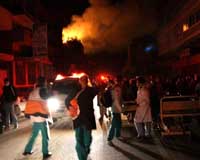| . |  |
. |
Washington (AFP) April 7, 2011 A top US general said Thursday it was unlikely that Libya's rebel forces could launch an assault on Tripoli and oust the regime's leader Moamer Kadhafi. General Carter Ham, who led the first stage of the coalition air campaign against Libya's regime, acknowledged the conflict between Kadhafi's troops and opposition forces was turning into a stalemate. Asked at a Senate hearing about the chances that the opposition could "fight their way" to Tripoli and replace Kadhafi, Ham said: "Sir, I would assess that as a low likelihood." And when pressed by Senator John McCain whether the situation was essentially a stalmemate or an "emerging stalemate," Ham said: "Senator, I would agree with that at present on the ground." Under tough questioning, the general said a stalemate is "not the preferred solution" in Libya but that outcome appeared "more likely" now than at the outset of the air campaign launched March 19. The exchange underscored growing concern in Washington and European capitals that the fight in Libya could be deadlocked, with Kadhafi firmly in control in Tripoli and badly-organized rebels unable to turn the tide even under the cover of NATO-led air power. Ham, head of the US military's Africa Command, said bombing raids had undercut the regime's ability to target civilians -- except in the besieged city of Misrata. The air strikes launched last month had "significantly degraded" the regime's ability "to attack civilians with the notable omission of Misrata," he said. The rag-tag rebels are struggling to defend Misrata, Libya's third city, under an onslaught from better armed regime forces equipped with tanks and artillery. Ham said Kadhafi had moved tanks and troops into parts of the city and that had made air strikes more difficult to carry out without endangering civilians. The US military pulled back about 50 combat aircraft this week from the UN-mandated air campaign as NATO took command of the Libya operation, which is designed to protect civilians from attacks by regime troops. But Ham said the US AC-130 gunships, which can target tanks and ground targets with powerful guns, were now available to the NATO commander of the air operation if he needed them. US military leaders had previously said the side-firing AC-130 aircraft, along with other ground-attack planes and fighters, would be withdrawn and placed on standby, pending a request from the NATO alliance. Ham said another warplane designed to knock out tanks, the A-10 Thunderbolt, was "on-call" but not immediately available to NATO like the AC-130 gunships.
Share This Article With Planet Earth
Related Links
 Israel pounds Gaza, kills 4 after missile hits bus
Israel pounds Gaza, kills 4 after missile hits busNahal Oz (AFP) April 7, 2011 Hamas militants fired an anti-tank missile at an Israeli school bus on Thursday, critically injuring a teenager, prompting the army to pound the the Gaza Strip, killing four and wounding more than 30. After the missile slammed into the bus, the Palestinians lobbed at least 45 mortar rounds and several rockets into southern Israel, hitting a house, and the army responded by staging multiple r ... read more |
|
| The content herein, unless otherwise known to be public domain, are Copyright 1995-2010 - SpaceDaily. AFP and UPI Wire Stories are copyright Agence France-Presse and United Press International. ESA Portal Reports are copyright European Space Agency. All NASA sourced material is public domain. Additional copyrights may apply in whole or part to other bona fide parties. Advertising does not imply endorsement,agreement or approval of any opinions, statements or information provided by SpaceDaily on any Web page published or hosted by SpaceDaily. Privacy Statement |